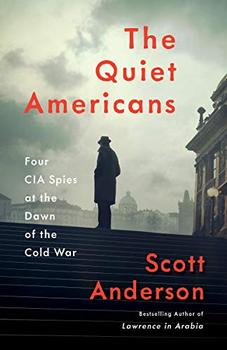Summary | Excerpt | Reviews | Beyond the Book | Readalikes | Genres & Themes | Author Bio
Four CIA Spies at the Dawn of the Cold War--A Tragedy in Three Acts

Critics' Opinion:
Readers' Opinion:
First Published:
Sep 2020, 576 pages
Paperback:
May 2021, 608 pages
 Book Reviewed by:
Book Reviewed by:
Peggy Kurkowski
Buy This Book
But if Wisner had been prescient in enlisting before the United States came into the war, he quickly discovered the downside of leading a life of advantage. Taking note of his academic and professional pedigree, his ONI superiors immediately shunted Wisner into a managerial role—and in 1941, just as today, "managerial" was usually shorthand for sitting behind a desk. Matters didn't improve when he was transferred to the naval cable and radio censorship office for the New York district. While that posting came with the benefit of allowing Wisner to continue to live with his family, it was also mind-numbingly dull. "He had a joke about it," his eldest son, Frank Wisner Jr., recalled, "that in the Navy, they gave him command of a cutter. A paper cutter, that is, chopping up documents."
After enduring the censorship office for nearly two years and seeing no end in sight, Wisner desperately looked to transfer to any military branch that might offer something more interesting. His lucky break came when an old Carter Ledyard colleague passed his name on to another former corporate lawyer who had joined in the war effort, William Donovan. As unpromising as that might sound, Donovan was no typical lawyer and neither was the wartime agency that he headed. Instead, the sixty-year-old attorney from Buffalo, New York, had earned his nickname, "Wild Bill," through heroism on the battlefields of World War I Europe, and he was now President Roosevelt's handpicked spymaster, the director of the Office of Strategic Services.
The adjectives used to describe William J. Donovan tend to run to hyperbole: brilliant, charismatic, fearless, larger-than-life. A former CIA officer based in postwar Berlin offered a different one: "Exhausting. He was a wonderful man, with an extraordinary mind, but he just never damn stopped." Donovan occasionally visited Berlin in the late 1940s and early 1950s, and sometimes stayed in the CIA officer's home. "He'd keep you up till one or two in the morning peppering you with questions, and then he'd be up at seven and he would start in all over again."
By the time Frank Wisner's résumé landed on his desk in October 1943, Wild Bill Donovan had been a prominent figure on the American political landscape for the previous quarter-century. A very successful Ivy League–educated lawyer, he had first garnered notice in the early days of World War I when he vigorously lobbied for the United States to join the military alliance of Great Britain, France and Russia; what made this noteworthy was that, as an Irish Catholic Republican, Donovan was from an ethnic group that overwhelmingly favored neutrality in the conflict.
Excerpted from The Quiet Americans by Scott Anderson. Copyright © 2020 by Scott Anderson. All rights reserved. No part of this excerpt may be reproduced or reprinted without permission in writing from the publisher.





The Funeral Cryer by Wenyan Lu
Debut novelist Wenyan Lu brings us this witty yet profound story about one woman's midlife reawakening in contemporary rural China.
Your guide toexceptional books
BookBrowse seeks out and recommends the best in contemporary fiction and nonfiction—books that not only engage and entertain but also deepen our understanding of ourselves and the world around us.